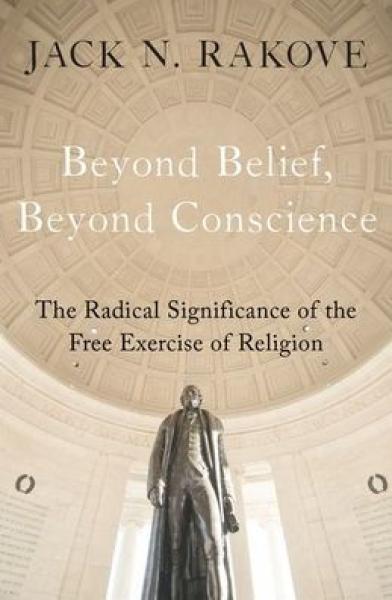Description
He finds that, as denominations and sects multiplied, Americans became much more tolerant of the free expression of rival religious beliefs. During the Revolutionary era, he explains, most of the new states moved to disestablish churches and to give constitutional recognition to rights of conscience. These two developments explain why religious freedom originally represented the most radical right of all. No other right placed greater importance on the moral autonomy of individuals, or better illustrated how the authority of government could be limited by denying the state authority to act. Together, these developments made possible the great revival of religion in 19th-century America.
As Rakove explains, America's intense religiosity eventually created a new set of problems for mapping the relationship between church and state. He goes on to examine some of our contemporary controversies over church and state not from the vantage point of legal doctrine, but of the deeper history that gave the U.S. its own approach to religious freedom. In this book, he tells the story of how American ideas of religious toleration and free exercise evolved over time, and why questions of church and state still vex us.
"Some time back in the early '00s, when-thanks to Dean John Sexton, my good friends Larry Kramer and John Ferejohn, and other colleagues-I used to hang out at New York University Law School, I had lunch one day with Dedi Felman, who was then a legal editor at Oxford University Press. We discussed her idea of doing a series of short provocative books on problems of rights in American constitutional history. When Geoffrey Stone of the University of Chicago (my literal birthplace) took over editing The Unalienable Rights series that Dedi organized, I quickly staked a claim to the Free Exercise Clause of the First Amendment. This interest reflected a longstanding concern with James Madison, dating to my dissertation work in the early 1970s, and other projects I had pursued since, including the problem of how one discusses the original meaning of the Constitution. The idea of religious freedom was a seminal element in the development of Madison's constitutional ideas. Equally important, the two components of the Religion Clause illustrated two landmark aspects of American constitutional practice. The free exercise of religion is a right different from all other rights because of the degree of moral autonomy it invests in each and every one of us. And the disestablishment of religion, by depriving the state of the power of regulating religion, offers the best example of the basic idea that the legislative authority government exercises depends on the will of a sovereign people. These are points we do not readily grasp. In part because contemporary Religion Clause jurisprudence is such a messy and vexed subject, and in part because justices and judges often prefer resolving claims of conscience on general grounds of freedom of speech, this original significance of "the religion question" often escapes attention. The subtitle of this book rests on my conviction that a historically grounded approach to this subject would be of some value to legal scholars. Among other things, that approach involves asking how we should compare the gradual development of European modes of religious tolerance with the emerging American conviction that the free exercise of religion was no longer a matter of mere toleration."--
A worthwhile look at a freedom too often taken for granted. --Kirkus
Prize-winning historian Jack Rakove's lucid narrative of how the US Constitution came to acknowledge religion's role in private conscience and public policy brings out the complex religious and intellectual history underlying the development of constitutional doctrine. Rakove shows that a historian's ability to provide context for the way in which successive generations have treated religion in public law can illuminate contemporary controversies and provide 'lessons worth pondering, ' even though history cannot, as Rakove carefully notes, provide the only firm grounding for the decisions we must make today. --Mark Tushnet, William Nelson Cromwell Professor of Law, Harvard Law School; author of Taking Back the Constitution
Original and illuminating! Jack Rakove paints a vivid portrait of Madison and Jefferson, driven by Enlightenment ideas, acting to disestablish state religion and construct our contemporary notion of religious freedom. Moving elegantly across the Atlantic and through the centuries, Rakove explains how constitutional rights of individual religious conscience and private, voluntary association replaced the far more limited concept of state toleration of religious dissent. The final chapters boldly attempt to integrate this now familiar, once revolutionary concept into our world of expanded government, wide religious pluralism, and elaborate judicial doctrine. --Ira C. Lupu, F. Elwood and Eleanor Davis Professor Emeritus of Law, George Washington University; co-author of Secular Government, Religious People
With characteristically sharp insight and good humor, Rakove traces the American history of religious freedom from colonization to today. This wonderful book presents the familiar combination of free exercise and non-establishment as the remarkable and unlikely innovation it was. And as Rakove's expert telling shows: it is all the more precious for that. --Teresa Bejan, Associate Professor of Political Theory, University of Oxford; author of Mere Civility
In [Beyond Belief, Beyond Conscience, Rakove] attempts to wrest the Free Exercise Clause away from the lawyers and their vocational focus on language and logic, and offers instead an intellectual history of American religious liberty that explains how its evolutions and quandaries are the product of historical circumstance. - Jeremy Rozansky, Mosaic
Product Details
- Oxford University Press, Brand
- Aug 3, 2020 Pub Date:
- 0195305817 ISBN-10:
- 9780195305814 ISBN-13:
- 240 Pages
- 8.2 in * 5.6 in * 1 in Dimensions:
- 1 lb Weight:




